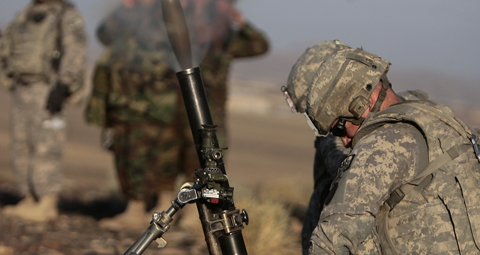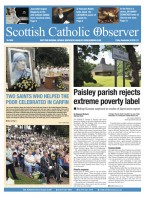August 26 | ![]() 0 COMMENTS
0 COMMENTS ![]() print
print

We have to see each other’s viewpoint
It’s important for our society that we listen to others, particularly those who say things we don’t like to hear
By Ross Ahlfeld
ONCE again I find myself reflecting on the tragedy that was the invasion of Iraq as I continue to read over the Chilcot report. This time I’m reminded of an occasion some years ago when I met Dr John Reid at a Labour Party Burns Supper in Gourock shortly after his spell in the cabinet.
My father—an independent councillor—and I had been invited as guests of the late David Cairns MP who was also the director of the old Christian Socialist Movement (now known as Christians on the Left) to which I belonged. David Cairns was a good guy, a popular and well-liked Inverclyde MP who is still respected and missed in the area today.
But like Dr Reid, David sincerely felt that military intervention in Iraq was the right thing to do. Like most Christians on the Left, I’d actively protested and campaigned against the obscenity that was the invasion and subsequent disastrous war and occupation which has left a legacy of misery for the Iraqi people (especially Christians) and an even worse legacy of global terrorism for the rest of us.
Yet despite this I always liked David Cairns; I’ve always felt that he and Dr Reid both honestly believed that the invasion was the best course of action, unlike so many others who simply toed the party line for their own political gain, knowing all along that the intervention was a huge mistake. I even maintained a grudging admiration for Dr John Reid for the way in which he went way off message with his comments on smoking.
You may recall that back in 2004, on the eve of the smoking ban, Dr John Reid said: “All I say is be careful, please be careful that we don’t patronise people. As my mother would put it, people from those lower socio-economic categories have very few pleasures in life and one of them they regard as smoking.”
On reflection, Dr Reid’s comments now seem misguided and ill-informed, but the point he was somewhat crudely trying to make was that he felt middle class health professionals were obsessed with giving instruction to people from lower socio-economic backgrounds.
In part, I can see where he was coming from, since a number of Christians now perceive the state’s health and social care policy as increasingly ideologically driven in seeking to take the place of the family and community.
For example, there are very many things some of us Christians don’t fully understand about life in an increasingly secularised Scotland. We don’t really get many of the policy developments within the area of health and social care.
For instance, we sometimes don’t understand how an organisation such as the Royal College of Midwives can hold such an extreme position on scrapping the abortion time limit. Neither can we fathom the implementation of a mandatory and costly Named Person Scheme being foisted upon us at a time of austerity and cuts to services.
Equally, Christians also struggle to comprehend why it is that drug and alcohol workers seem unable to tell our school children unequivocally that they shouldn’t take drugs because they’re illegal, dangerous and can kill you. Even in the wake of tragic drug- related fatalities among our young people.
In other words, Christians are often pretty clear on what they think is right and wrong while modern society can appear to be more relativistic. On the other hand, most of our elected representatives, secular activists and health and social care workers are equally clear on the fact that they are acting on the best interests of vulnerable children and wider society.
And while we might suspect them of holding an inherent distrust of family as ultimate authority for children, we have to accept that such individuals are acting in good faith and sincerely do want the best for the community despite our own misgivings. Equally, many non-religious people also perceive the fears of faith communities as being based solely on a desire on our part to impose a particular set of arcane and oppressive religious values on society which they don’t share.
As always, there is a complete lack of understanding and common good at play on such issues. These debates are frequently polarised, yet for me the compromise often lies in our own heritage and tradition.
For example, if we look back to the time of the Temperance Movement you might assume that all Scottish Christians were all firmly against the consumption of alcohol, yet in reality, temperance was more about common sense, preventing out and out alcoholism and stopping working men spending their entire weekly wage on drink.
When it comes to childcare and healthcare, Christians might just still have something positive and unique to offer the conversation. Not just the promotion of pro-life and the encouragement of palliative care, but also the ability to give their hearts and to enter into a personal relationship of love and communion with the most forgotten and marginalised people in our communities today.
It is important for us to continue to try and see each other’s viewpoint, be it on issues of national security and foreign policy or issues around health and social policy concerning our children. We must now look to the future, forgive past differences, try see the human being and try to understand how that individual arrived at their position.
This is exactly how I felt all those years ago when introduced to two warm and open human beings with whom I profoundly disagreed with on the issue of Iraq. And this is how I approach those with whom I strongly disagree with on the issue of Named Person today.
As Jean Vanier teaches us, “Each one of us, I believe, is on a journey towards this openness where we risk to love. Growth toward openness means dialogue, trusting in others, listening to them, particularly to those who say things we don’t like to hear, speaking together about our mutual needs and how we might grow to new things.
“The birth of a good society comes when people start to trust each other, to share with each other, and to feel concerned for each other.”











